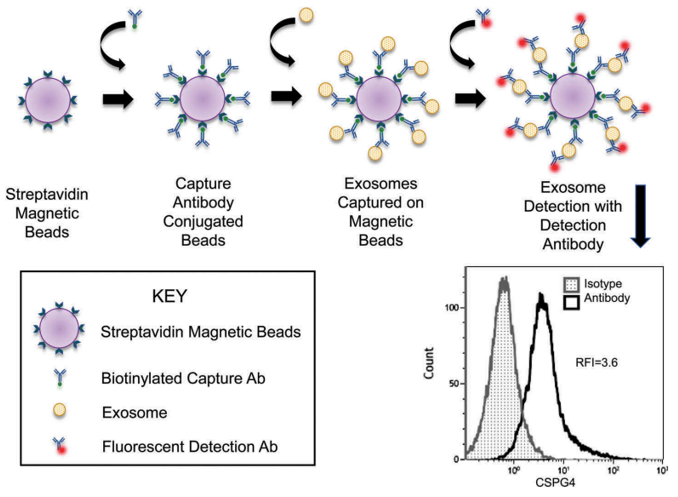Immunoaffinity Capture based Exosome Purification Service
Overview Services Features FAQs
Overview
With extensive experience in exosome preparation, Creative Biolabs has developed immunoaffinity capture-based techniques to isolate exosomes with high purification and homogeneity, particularly from specific cell types such as tumor cells.
Immunoaffinity
Exosomes are membrane vesicles with diameters ranging from 30 to 150 nm, containing various proteins and receptors on their membranes. This characteristic allows for the development of highly specific isolation techniques based on immunoaffinity interactions between these membrane proteins (antigens) and their antibodies, as well as between receptors and ligands. Consequently, immunoaffinity capture-based techniques have been established for the isolation and purification of exosomes.
Ideal biomarkers for exosome immunoisolation are membrane-bound, lack soluble counterparts, and are uniquely expressed or highly concentrated on exosomes from specific biological sources. Studies have identified several specific molecules on the surface of exosomes, such as CD9, CD63, and CD81. Antibodies against these markers can be immobilized on various media, such as magnetic beads, to capture exosomes.
 Fig.1 Detection of CSPG4+ exosomes immunocaptured on beads by flow cytometry.1,2
Fig.1 Detection of CSPG4+ exosomes immunocaptured on beads by flow cytometry.1,2
Services
Immunoaffinity Service Workflow:
1. Selecting specific surface markers of exosome
Identifying specific molecules on the surface of exosomes derived from particular cell types is crucial for immunoaffinity purification. Our experienced technical team and up-to-date exosomal target molecular database help identify the best exosomal tags for our clients.
2. Designing target-specific antibody
Creative Biolabs specializes in developing highly specific, high-affinity antibodies for research, diagnostic, and therapeutic use.
3. Constructing immobilized media for Immunoaffinity
Our professional team has developed submicron-size magnetic particles for use in magneto-immunocapture. These antibody-coated magnetic particles effectively isolate exosomes with high purification and homogeneity.
Features
-
State-of-art technology platform
-
Experienced and professional technical team
-
Best after-sale service
-
High yield and low consumption
-
Relatively integrated exosomes
Creative Biolabs has extensive experience in the field of exosome isolation and purification. We are confident to offer the best exosome purification services for global customers based on the immunoaffinity capture-based techniques. With our services, you can attain the high-purity and intact exosomes that will contribute to your downstream analyses, including more accurate quantification of vesicles and proteomic characterization.
If you have any demands in exosome preparation, please don’t hesitate to contact us for more information.
FAQs
Q: What types of markers are applicable for the immunoaffinity capture service?
A: We offer customized services targeting various surface markers, including but not limited to tissue/cell-specific antibodies, tumor biomarker antibodies, cell surface receptors, etc. If you have specific marker requirements, please contact us to assess project feasibility.
Q: Are there any immunoaffinity-based exosome purification kits available?
A: We have shelf-ready exosome capture kits for cell culture supernatants and urine samples (including EIK-06, EIK-07, EIK-08, EIK-09) as well as for serum and plasma samples (including EIK-13, EIK-14, EIK-15). These kits are designed to capture exosome subpopulations carrying exosome markers (optional CD9, CD63, or CD81). Additionally, we can provide customized exosome capture kits to facilitate the purification of exosome subpopulations of interest.
References
-
Sharma, P.; et al. Immunoaffinity-based isolation of melanoma cell-derived exosomes from plasma of patients with melanoma. Journal of Extracellular Vesicles. 2018, 7(1):1435138.
-
Distributed under Open Access license CC BY 4.0, without modification.
For Research Use Only. Cannot be used by patients.
Related Services:

 Fig.1 Detection of CSPG4+ exosomes immunocaptured on beads by flow cytometry.1,2
Fig.1 Detection of CSPG4+ exosomes immunocaptured on beads by flow cytometry.1,2









